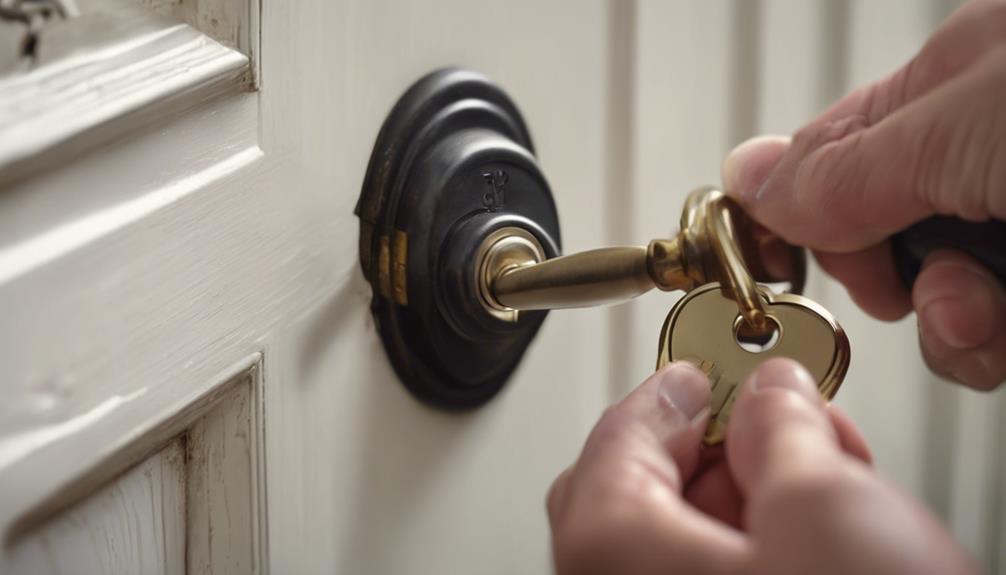Understanding landlord-tenant laws on lock replacement is crucial for your safety and security. As a tenant, you have the right to request lock changes, especially if you feel your safety is at risk. Landlords must guarantee all locks are functional and typically cover replacement costs. If your landlord doesn't address your request, keep a record of your communications and consider your next steps. Both tenants and landlords benefit from being informed about legal obligations and rights. There's more to know about maneuvering these laws effectively, so keep exploring your options to strengthen your position.
Key Takeaways
- Landlords must ensure all locks are functional and secure to comply with tenant safety regulations.
- Tenants have the right to request lock changes, provided they inform the landlord beforehand.
- Local regulations may dictate specific procedures for lock replacement and maintenance compliance.
- Failure to address lock issues can lead to legal action or financial penalties for landlords.
- Both parties should document communications regarding lock changes to protect their rights and responsibilities.
Overview of Landlord Responsibilities
Landlords have several key responsibilities that guarantee a safe and habitable living environment for their tenants. Among these, landlord lock duties play a significant role in assuring security. You must make certain that all locks on doors and windows are functional, providing tenants with peace of mind.
Regularly inspect and maintain these locks, replacing them when necessary to prevent unauthorized access. Additionally, it's important to be aware of state laws regarding tenant move-out lock re-keying, as these laws dictate your obligations in this area legal obligations to re-key locks.
Furthermore, when a tenant moves in or out, it's your responsibility to change the locks. This simple act protects the new tenant from any potential security risks posed by previous occupants. Keeping an updated record of who's access to keys also falls under your landlord lock duties.
Additionally, make sure that all entry points are well-lit and free from obstructions, enhancing safety for tenants. It's essential to respond promptly to any lock-related issues reported by tenants, demonstrating your commitment to their well-being.
Tenant Rights Regarding Locks
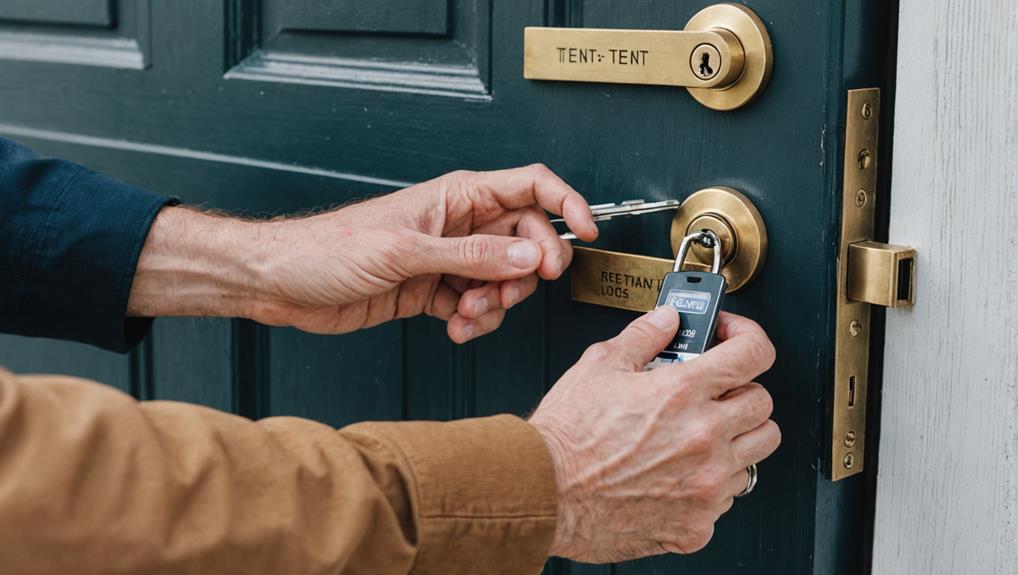
When it comes to locks and security, tenants have important rights that guarantee their safety and privacy. Understanding your tenant lock rights is vital in making sure you feel secure in your home.
Businesses often emphasize the importance of lock replacement for enhanced security, and similar principles apply to residential settings. You have the right to change the locks in your rental unit, but it's important to inform your landlord beforehand, as most leases require you to do so. This communication helps maintain a respectful relationship while also protecting your interests.
Important lock replacement can greatly impact your security.
If you ever feel your locks are inadequate or if someone has unauthorized access to your home, you can request that your landlord address the issue promptly. Remember, your safety is paramount, and landlords typically have a responsibility to make certain that your locks are functioning correctly.
In some cases, if your landlord fails to respond to your requests about lock issues, you may have the right to take further action, such as seeking legal advice or reporting the problem to local housing authorities.
Always document your communications and the condition of your locks to support your case. Ultimately, knowing your tenant lock rights empowers you to advocate for your safety and well-being.
Legal Requirements for Lock Replacement
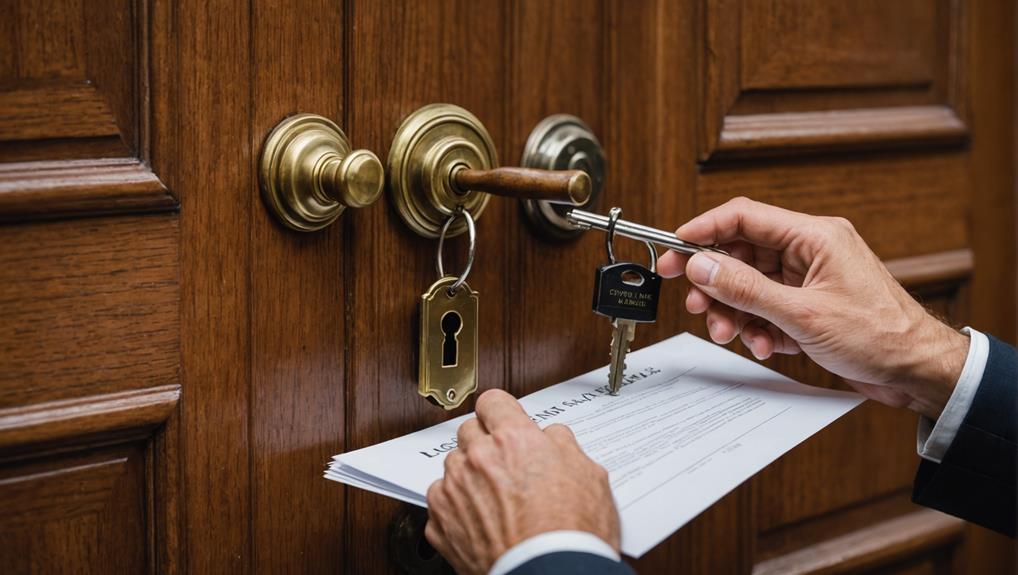
When it comes to security, you have the right to feel safe in your home. Your landlord's duty is to maintain secure locks, ensuring your peace of mind.
This includes understanding the importance of timely lock replacements, particularly after tenant turnover or security breaches.
It's essential for landlords to be informed about essential tips for landlords regarding when and how to replace locks.
Let's explore what this means for you and your landlord with respect to lock replacement.
Tenant's Right to Security
Ensuring your safety as a tenant often hinges on the integrity of your locks. As a tenant, you have the right to a secure living environment, and that includes functioning locks. When it comes to lock replacement, it's vital to understand the landlord's responsibility. If your locks are damaged or outdated, your landlord must address these issues promptly.
Here's a quick overview of your rights regarding lock replacement:
| Aspect | Details |
|---|---|
| Lock Condition | Locks must be in good working order. |
| Requesting Changes | Notify your landlord in writing. |
| Timeframe | Landlords typically have a set period to respond. |
| Emergency Situations | Immediate response required for safety. |
| Cost Responsibility | Usually, the landlord covers replacements. |
If your landlord fails to replace faulty locks, you may have grounds to escalate the issue. Remember, your safety should always come first. Don't hesitate to advocate for your right to secure locks, as this is an important aspect of your living conditions.
Landlord's Duty to Maintain
As a tenant, you rely on your landlord to keep your living space safe and secure, which includes maintaining locks. Landlords have a legal obligation under landlord-tenant lock replacement laws to guarantee that all entry points are equipped with functioning locks. This duty helps protect you and your belongings from potential threats.
When you notice a broken or malfunctioning lock, it's vital to report it to your landlord promptly. Your landlord should address such issues swiftly, as failure to do so might violate local housing codes and jeopardize your safety.
Remember, a well-maintained lock isn't just about security; it also fosters peace of mind.
If your landlord refuses to replace or repair the lock in a reasonable timeframe, you might've the right to take further action. This could include contacting local housing authorities or even seeking legal advice. Understanding your rights can empower you to advocate for a secure living environment.
Ultimately, landlords must prioritize maintenance, including lock replacement, to fulfill their responsibilities and guarantee your home remains a safe haven. Your safety is paramount, and it's important to communicate openly with your landlord about any concerns.
Security and Habitability Standards
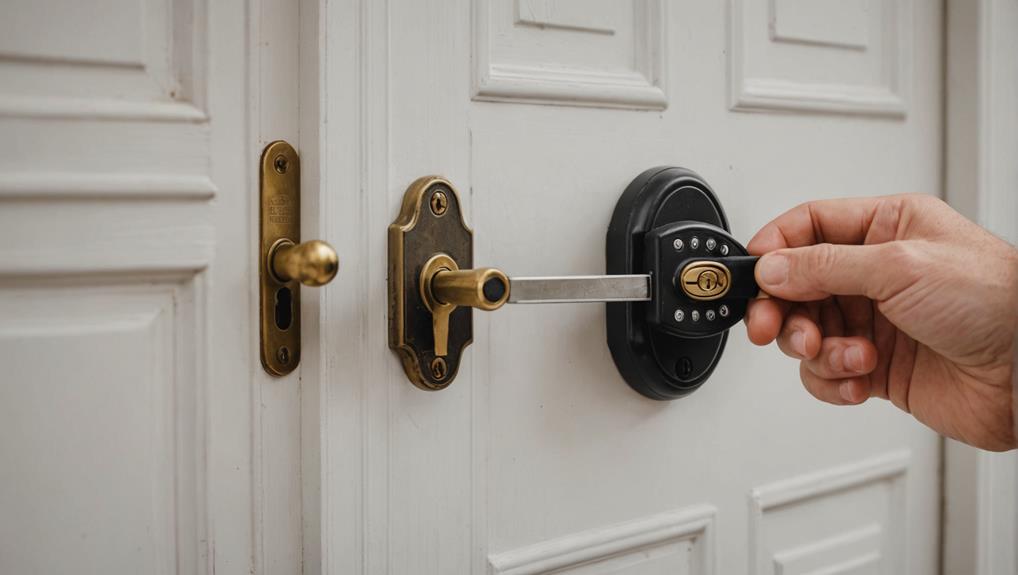
While some may overlook the importance of security and habitability standards, these factors are vital for both landlords and tenants. Understanding these standards is important not only for compliance but also for fostering a trustworthy landlord-tenant relationship.
By familiarizing yourself with local lock replacement regulations, you can create a safe and comfortable living environment for everyone involved. For landlords, adhering to security and habitability standards isn't just a legal obligation; it shows your commitment to tenant welfare.
For tenants, knowing these standards empowers you to advocate for your rights.
Here are four key points to take into account regarding security and habitability standards:
- Secure Entrances: Verify that all entry points have functioning locks. Familiarize yourself with rental lock replacement rules to maintain security.
- Adequate Lighting: Well-lit common areas deter crime and enhance safety.
- Working Utilities: Reliable heating, plumbing, and electricity are fundamental for habitability. If issues arise, address them promptly.
- Health Hazards: Regularly check for mold, pests, and other hazards to maintain a healthy living space.
Procedures for Requesting Lock Changes
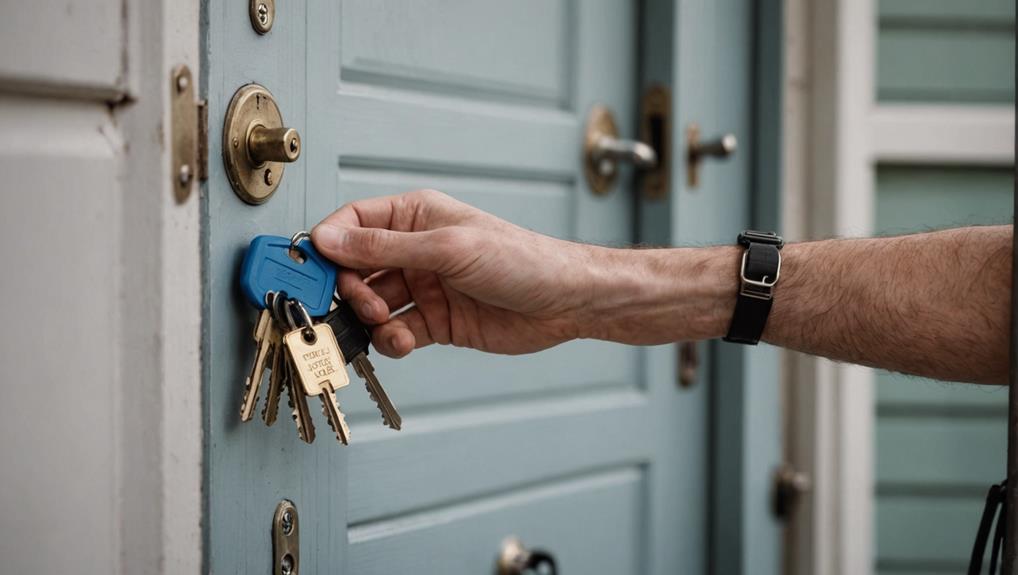
Understanding security and habitability standards sets the stage for effective communication between landlords and tenants, especially when it comes to lock changes. When you feel the need for a lock change, the first step is to clearly articulate your concerns.
If you believe a legal lock replacement is necessary for your safety or peace of mind, prepare a written request outlining your reasons. Additionally, it's important to be aware of the best practices for re-keying locks in rental properties, as this can provide you with further justification for your request essential tips for re-keying locks.
In your request, include specific details, such as the current lock's condition and any incidents that prompted your concern. Make sure to mention any relevant laws or regulations that support your request, as this illustrates your understanding of your rights.
Once you've drafted your request, deliver it to your landlord promptly. It's best to send it via email or certified mail, ensuring you have a record of your communication.
After submitting your request, allow your landlord a reasonable amount of time to respond. If they agree to the lock change, discuss the timeline and any potential costs involved.
If they don't respond or refuse, it's vital to know your rights and consider your next steps, always aiming for a collaborative resolution.
Consequences of Non-Compliance
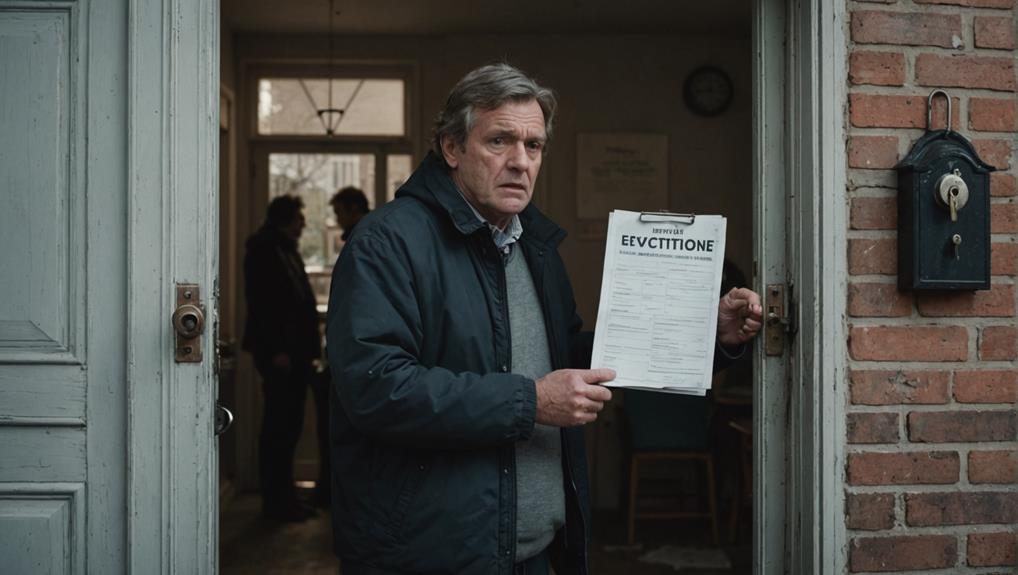
Non-compliance with landlord-tenant laws can lead to significant consequences for both parties.
If you overlook your lock replacement legal obligations, you might face serious repercussions. Properly understanding the legal implications of re-keying locks is essential for maintaining safety and compliance in rental properties, as failure to do so can expose landlords to liability issues understanding legal implications.
Here are four potential outcomes to take into account:
- Legal Action: Tenants may take you to court for not ensuring their safety through proper lock maintenance. This can lead to costly legal fees and a judgment against you.
- Financial Penalties: You could incur fines from local authorities for failing to comply with regulations surrounding lock replacements and security requirements.
- Loss of Trust: If tenants feel unsafe due to inadequate lock replacements, you risk damaging your relationship with them. This can lead to high turnover rates and difficulty finding new tenants.
- Insurance Issues: Non-compliance may affect your insurance coverage. If a break-in occurs due to faulty locks, your insurer might deny your claim, leaving you vulnerable to significant losses.
Frequently Asked Questions
Can Tenants Change Locks Without Landlord Approval?
You might be wondering if you can change the locks on your door without asking your landlord first.
It's important to reflect on the relationship you have with your landlord and the lease terms. Open communication can often prevent misunderstandings.
If security's a concern, letting your landlord know about your intentions might lead to a positive solution.
Always prioritize a collaborative approach to maintain a good living situation for everyone involved.
What Should I Do if I'm Locked Out?
If you're locked out, don't panic.
First, check if you left a spare key with a trusted friend or neighbor.
If that's not an option, consider calling a locksmith for assistance. They can help you regain access quickly and safely.
While you wait, stay calm and think about your next steps.
Once you're back inside, you might want to guarantee you have a backup plan to avoid future lockouts.
Are There Additional Costs for Lock Replacements?
Did you know that nearly 15% of people face unexpected lock replacement costs each year?
If you're considering a lock replacement, you should be aware of potential additional costs like installation fees or higher security options.
It's always wise to get a few quotes from locksmiths to guarantee you're getting a fair deal.
How Often Should Locks Be Replaced?
You should consider replacing locks every few years, or sooner if they show signs of wear or damage.
If you've recently moved into a new place, it's wise to change the locks right away for your security.
Additionally, if someone loses a key or if there's been a security breach, it's best to replace them immediately.
Regularly checking and maintaining your locks can help guarantee your safety and peace of mind.
What Types of Locks Are Considered Secure?
Choosing secure locks is like picking the right shield in battle; it protects what's valuable.
Deadbolts are a great choice, as they offer sturdiness and resist forced entry.
Smart locks add convenience and can alert you to unauthorized access.
Keypad locks provide keyless entry, keeping your space safe and accessible for you and your guests.
Conclusion
In summary, understanding landlord-tenant laws about lock replacement is essential for your safety. As a tenant, you have rights that protect you from potential security risks. If your landlord neglects their responsibilities, it could feel like living in a fortress with a broken gate! Always know your rights and how to request lock changes properly. Protect your home, and don't hesitate to advocate for your security—it's your right to feel safe where you live!

